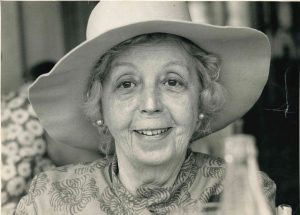Olga Umansky, MLIS, is a librarian and archivist of the Hanns Sachs Library at BPSI. Her remarks below originally appeared in the Summer/Fall 2021 issue of the library newsletter, which can be read here.

BPSI Photograph Collection, BPSI Archives
This portrait of BPSI Member Lydia Gibson Dawes, MD (1896-1990), donated to our archives by John Terry Maltsberger in 1990, is one our recent treasured rediscoveries. Lydia Dawes was one of BPSI’s first women trainees in 1936-1940, first child analyst and child psychiatrist in Boston Children’s Hospital in 1940, affiliated with Mass General, Beth Israel, and Judge Baker Children Center since late 1930s. She set up several pioneering child psychiatry units, and was a beloved educator at BPSI, Harvard Medical School, and the Schools of Social Work at Smith College and Simmons College.
Lydia Dawes, or “Gibby” as she was known to her friends and BPSI colleagues, belonged to the generation of young Americans who had traveled to Europe in the 1920s and 1930s to be trained in psychoanalysis by the founders. Lydia and her husband, Daniel Dawes, lived in Vienna in 1932-1936, initially so that Daniel could be analyzed by Helene Deutsch. Lydia was not interested in becoming an analyst at first, but her devotion to pediatrics led her to the analysis with Anna Freud who had convinced her of her gift at understanding children. Jenny Waelder-Hall, another child analysis pioneer, became her supervisor. Born in Buffalo, NY and educated at William Smith College in Geneva, NY, she graduated from Yale Medical School in 1929. Yale was one of the first US schools to accept female medical students as early as 1916. In her interview, Dawes mentions there were four other women in her class, “one in the class ahead” and “three in the class below” (Dawes, 1973, p. 42). She first heard about psychoanalysis from Dr. Frankwood Williams, a New York analyst who lectured at Yale. He was the one who advised the Dawes to go to Vienna.
According to Sanford Gifford, she had “an exploratory, and even restless, spirit” and “a knack for finding herself at the beginning of things.” Colleagues often commented on her pungent sense of humor and her rebellious character. Anna Freud, Lydia’s analyst in Vienna, called her “a revolutionary” (Gifford, p. 2). The transcript of Lydia’s 1973 interview to Sanford Gifford brings back her animated voice. In one of her memories, young Erik Erikson gives her German lessons while she confronts him about his teaching methods. “He was making me make lists and learn them by heart, you know? I said to him ‘Erikson, I can’t do it. I can’t learn that way. Talk to me'” (p. 27). Another story invokes Edith Jackson who lived in Vienna for six years to undergo analysis with Freud. Dawes recalls Edith’s bed-sit with a pot-bellied stove and her odd habit of getting mad at her clothes (p. 25-28). There are many stories about practical jokes young Americans in Vienna played on each other and their analysts. One prank, for example, involved setting up every new student to yell out “Dr. Spitz, your watch, you forgot to take it off” whenever René Spitz went for a dive in the river. A student would then act surprised when Spitz came out of the water and proudly announced his watch was waterproof. They all knew it and kept doing it over and over, so “he’d have the pleasure of showing it.” (p. 69). They also pulled various stunts in their analytic sessions, i.e. keeping silent to test how long their analyst would stay still or retelling “some dreams that we never had” (p. 70). Lydia Dawes managed to carry this lively spirit into her later years. She humorously describes her dinners with “the funniest people she knew,” Annie and Maurice Katan who would endlessly swap dishes and insist on a fancy lunch (p. 66) as well as her squabbles with Arthur Valenstein over his remark about “one of those women analysts” who “must have had a terrible penis envy” (p. 81). She reports on her professional quarrels, “in a polite way,” and her ultimate split with Beata Rank at the Putnam Children Center (p. 21). She unabashedly comments on unhealthy hospital practices toward disturbed children, makes jokes about arrogant psychiatrists, and describes the stodginess of BPSI’s Education Committee on which she presided for many years. A brave soul, she managed to surprise Anna Freud by asking to let Anna’s family dog into their first psychoanalytic session. (Most patients were afraid of dogs) (p. 36). BPSI Member Malkah Notman remembers how, many years later, Anna Freud greeted Gibby on one of her visits to Boston with “You used to be Lydia Dawes” and she immediately retorted “I still am!”
References:
- (1990, Dec 3). Dr. Lydia Dawes, 94. Child Psychiatrist and Educator. Boston Globe.
- Dawes, L. (1973). Interview to Sanford Gifford. Oral History Transcripts, BPSI Archives.
- Gifford, S. (1991). Lydia Dawes (1896-1990). Sanford Gifford Papers, BPSI
Archives.
Olga Umansky can be contacted by email here.
***
The opinions or views expressed on the Boston Psychoanalytic Society & Institute (“BPSI”) social media platforms, including, but not limited to, blogs, Facebook posts and Twitter posts, represent the thoughts of individual contributors and are not necessarily those of the Boston Psychoanalytic Society & Institute or any of its directors, officers, employees, staff, board of directors, or members. All posts on BPSI social media platforms are for informational purposes only and should not be regarded as professional advice.
BPSI does not control or guarantee the accuracy, relevance, timeliness or completeness of information contained in its contributors’ posts and/or blog entries, or found by following any linked websites. BPSI will not be liable for any damages from the display or use of information posted on its website or social media platforms. BPSI cannot and does not authorize the use of copyrighted materials contained in linked websites.

